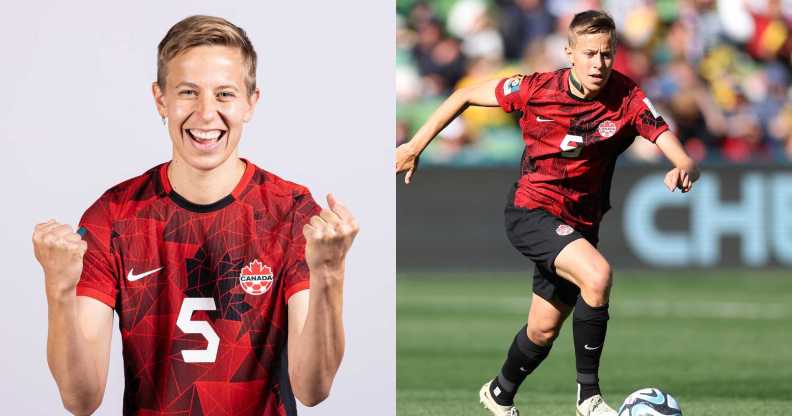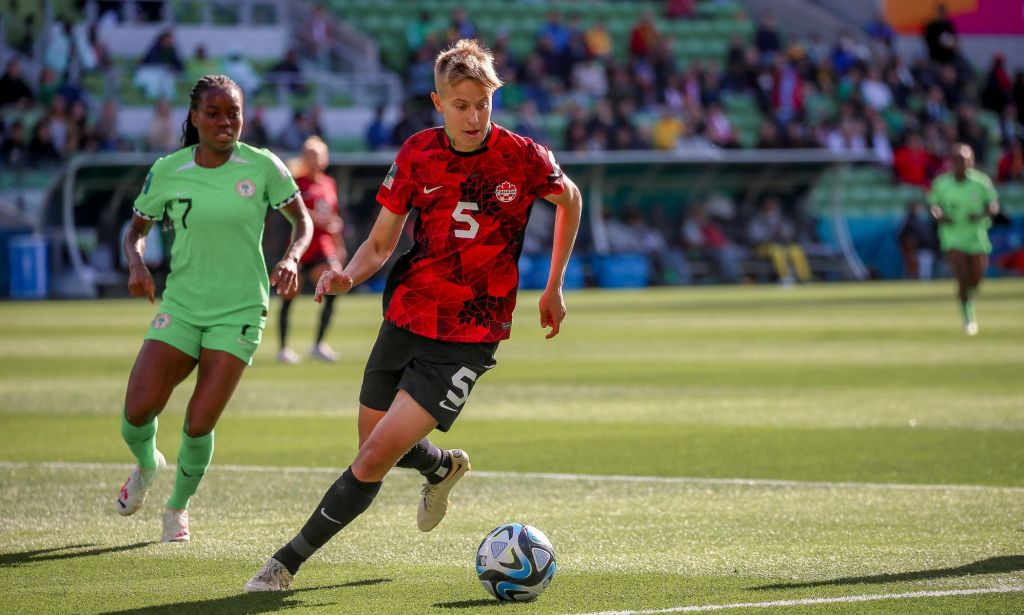Canada’s Quinn brings joyful trans and non-binary representation to the Women’s World Cup

Canadian footballer Quinn is vying to become the first openly trans and non-binary athlete to win a World Cup at the 2023 games in Australia and New Zealand. (Getty)
Canadian footballer Quinn is vying to become the first openly trans and non-binary athlete to win a World Cup at the 2023 games in Australia and New Zealand. (Getty)
Women’s World Cup 2023 star Quinn knows a thing or two about breaking barriers – whether it’s being the first trans, non-binary Olympic gold medallist or showing others that they can be gender-diverse in the sporting landscape.
The Canadian footballer is no stranger to the limelight. They made their Olympic debut at Rio 2016 when they helped Canada win the bronze medal before competing at their first FIFA Women’s World Cup in 2019.
Then, in 2021, they made sporting history as the first openly trans, non-binary person to win an Olympic medal when they captured the gold medal with Canada at the Tokyo Games.
Now, Quinn is trying to secure another historic achievement by becoming the first out trans, non-binary athlete to win a World Cup with Team Canada at the 2023 games, which take place across both Australia and New Zealand.
It wouldn’t just be a personal victory for Quinn; it would be the first World Cup win for Canada.
This is also the first time the midfielder is playing on the Canadian Women’s World Cup team since coming out as trans and non-binary in 2020.
In their powerful announcement, Quinn described how they wanted to be “visible to queer folks who don’t see people like them on their feed” because “it saved [their] life years ago”. They also called on cis folks to be “better allies”.
Since then, they’ve stayed true to their word and been a shining beacon of trans, non-binary representation in the football world – whether it’s advocating for trans rights in sports, fighting for pay equity or scoring big on the field.
After their history-making Olympic victory, Quinn felt proud seeing their name on the line-up, but there was also sadness “knowing there were Olympians before [them] unable to live their truth because of the world”.
“I feel optimistic for change. Change in legislature. Changes in rules, structures, and mindsets,” Quinn said.
“Mostly, I feel aware of the realities. Trans girls being banned from sports. Trans women facing discrimination and bias while trying to pursue their Olympic dreams. The fight isn’t close to over … and I’ll celebrate when we’re all here.”

While they will be concentrating on their World Cup performance, Quinn is still keen to use their platform and voice to create a better future for athletes like them.
Non-binary World Cup star Quinn is launching a mentorship programme
Quinn will be taking their powerful representation to the next level with a new one-to-one mentorship programme set to launch this autumn. The programme, called the GE Appliances See Them, Be Them initiative, is designed to help girls and gender-diverse players get involved in sports, as well as encourage others to participate in Canadian soccer.
See Them, Be Them will see eight girls and gender-diverse players receive guidance from Quinn both on and off the field. Additionally, up to 100 other players will receive virtual mentorships with the trans, non-binary football icon.
Quinn told the Streets of Toronto that young football players must have role models in sports. They recalled how seeing and interacting with top players was “hugely important” for them to understand there was a “pathway for [them] to then become a national team player and a professional athlete”.
“Being a transgender athlete, it was difficult to see my place in sports and see that I belong,” Quinn said.
“And the same goes for cisgender girls who are navigating their experience; we have a male-dominated sports culture in North America and they deserve to see they have a place in this sport.”
The footballer told Xtra that the programme is especially important as it comes at a “really scary time for trans inclusion in sports” when anti-trans rhetoric is rife and trans youth are being “weaponised for political gain”.
“As these narratives go into more mainstream media, it’s really important to have that education piece around why trans inclusion is important and why, when we start policing bodies, that impacts everyone,” they said.
“It impacts, obviously, our transgender population, who just want to play the sports that they love. And then as well it’s going to impact every single woman in sports.”
Quinn is among the biggest (and queerest) names in football to play at the FIFA Women’s World Cup, which kicked off on Thursday (20 July) and is set to close in August.
Almost 12 per cent of the 736 players competing at the 2023 games are part of the LGBTQ+ community – a record-breaking number of out queer footballers at a Women’s World Cup.
The LGBTQ+ players in this year’s FIFA Women’s World Cup include the US’s Megan Rapinoe and Kristie Mewis, England’s Rachel Daly and Marta Vieira da Silva of Brazil.

